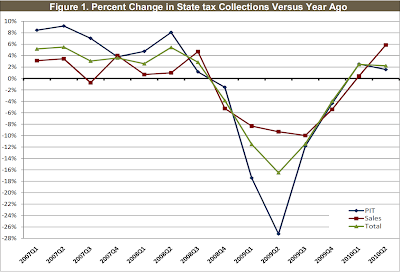State Tax Revenues Slowly Rebound … But
Courtesy of Mish
The Nelson Rockefeller Institute reports State Tax Revenues Are Slowly Rebounding. However, as always, the devil is in the details. Let’s take a look.
Preliminary tax collection data for the April-June quarter of 2010 show improvement in overall state tax collections as well as for personal income tax and sales tax revenue. However, revenue collections remain significantly below peak levels and are still weak in a number of states.
The Rockefeller Institute’s compilation of data from 47 early reporting states shows collections from major tax sources increased by 2.2 percent in nominal terms compared to the second quarter of 2009, but was 17.2 percent below the same period two years ago.
State Tax Collections
Gains were widespread, with 30 states showing an increase in revenues compared to a year earlier. After adjusting for inflation, tax revenues increased by 1.4 percent in the second quarter of 2010 compared to the same quarter of 2009.
In terms of dollars, California reported the largest increase in personal income tax collections in the second quarter of 2010, where revenue collections rose by $1.6 billion or 11.5 percent. Such increase is mostly attributable to legislated changes. Without California, personal income tax collections for the second quarter of 2010 show a 1.1 percent decline nationally in the April-June quarter, compared to the same period of 2009.
Sales tax collections increased by 5.9 percent in the second quarter of 2010 compared to the same quarter of 2009, but were still 5.4 percent lower than two years ago. With 42 of 45 sales-tax states reporting so far, only seven states reported declines in sales tax collections compared with the same quarter last year.
Among the corporate income tax states, 19 of 43 early reporting states reported declines for the second quarter compared to the same quarter of the previous year, while 24 showed gains. Fourteen states reported double-digit declines, while seventeen states reported double-digit growth in corporate income tax collections in the second quarter of 2010. The large variation among states’ corporate income tax revenues is due to volatility in corporate profits and in the timing of tax payments.
Among individual states, California reported the largest decline in corporate income tax collections in the second quarter of 2010, where revenue collections declined by $2.7 billion or 42.3 percent. California’s corporate income tax collections were strong in the April-June quarter of 2009 due to legislation that required taxpayers to pay 30 percent of annual estimated payments in each of their two first prepayments (April and June for calendar year corporations) versus the prior requirement of 25 percent. Without California, corporate income tax collections for the second quarter of 2010 show a 1.9 percent decline nationally in the April-June quarter, compared to the same period of 2009.
The Outlook
The state tax revenue picture in the first two quarters of the calendar year 2010 represented significant improvement from the collapse of the preceding quarters. Still, in most states, the overall trend for fiscal 2010 was very much in the negative. Now that most states have closed the books for fiscal year 2010, preliminary figures show that 34 of 44 states for which complete fiscal 2010 data are available saw declines in overall tax collections for the year. Collections from the two major tax sources — personal income and sales — were also negative for the fiscal year. With revenues still below prerecession levels and question marks surrounding the national economy, states face continued uncertainty at best — with continuing budget challenges a sure bet.
Improvement Mirage
Please see article for more charts, data, and analysis.
The "improvement" in personal income taxes was a mirage caused by California speeding up collection of personal income taxes. California required payment of estimated taxes before money was even earned! Ignoring California, income tax collections actually declined from a year ago.
Much of the improvement in sales taxes is a result of tax hikes, not increased sales. Those effects will soon wear off in year-over-year comparisons (assuming of course there is not another round of sales tax hikes, by no means a good bet).
In simple terms that dramatic rebound shown in the first chart merely means things have stabilized but only vs. the rock bottom depressed level of second quarter of 2009.
Gallup Polls and sales data from MasterCard Advisors paints the same grim picture. Please see Gallup Poll Shows Consumer Spending Pullback, Consumer Confidence Levels Below Depressed 2009 Levels ; Back-to-School Sales Bust Says WSJ for details.
States remain in a world of hurt and the economy is slowing once again. I expect GDP contraction in the third quarter.
Thus, states are going to have to address the problem of public union wages and pension benefits whether they like it or not.




